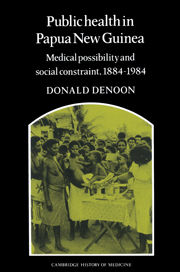Book contents
- Frontmatter
- Contents
- Acknowledgements
- Maps of Papua New Guinea
- Introduction
- I The rise and fall of tropical medicine
- II The rise and fall of the great campaigns
- 8 Miracle drugs, new perceptions and the post-war Public Health Department
- 9 The health campaigns
- 10 Women and children last
- 11 Health education
- 12 A national health system
- 13 Primary health care
- 14 The past and the future
- Notes
- Bibliography
- Index
14 - The past and the future
Published online by Cambridge University Press: 11 February 2010
- Frontmatter
- Contents
- Acknowledgements
- Maps of Papua New Guinea
- Introduction
- I The rise and fall of tropical medicine
- II The rise and fall of the great campaigns
- 8 Miracle drugs, new perceptions and the post-war Public Health Department
- 9 The health campaigns
- 10 Women and children last
- 11 Health education
- 12 A national health system
- 13 Primary health care
- 14 The past and the future
- Notes
- Bibliography
- Index
Summary
Past performance is our only guide in suggesting how people might extract the greatest benefit from the resources at their disposal. The historical records of medical services are irritatingly incomplete: they tantalise but do not satisfy. The distinction between ‘well-being’ and ‘ill-being’ is itself arbitrary. Then medical officers record the information which happens to interest them, and historians compound the problem by selecting such information as seems significant in the light of present conditions and concerns. That arbitrary, narrow and doctor-centred record is nevertheless our only evidence on which to pass judgement and to guide policy.
Medical historians explain the evolution of policies and programmes by seeking change within the medical profession, or by reference to change in the wider society and economy. Writers about Papua New Guinea have located the initiative in one of four ways. The locomotive of change may be Great Doctors, or the medical profession on a world scale; or medical services may spring from the political economy of the country, or from the interests of the colonial authorities who (in the case of Papua New Guinea) paid most of the medical bills.
Great Doctor theories of public health excite not only doctors, who enjoy some vicarious glory, but also scholars who prefer simple explanations. At least five doctors have seemed to command events in Papua New Guinea almost in Wagnerian fashion.
- Type
- Chapter
- Information
- Public Health in Papua New GuineaMedical Possibility and Social Constraint, 1884–1984, pp. 114 - 122Publisher: Cambridge University PressPrint publication year: 1989



